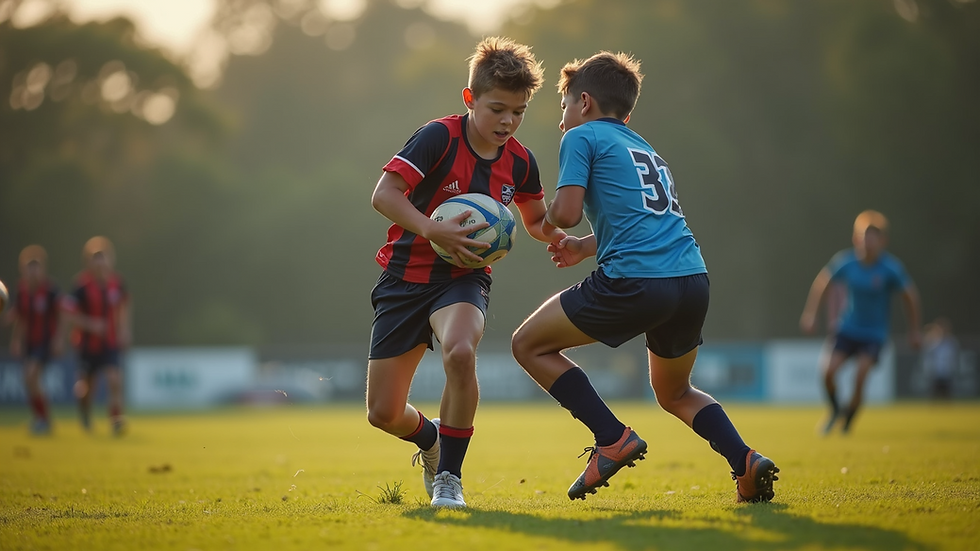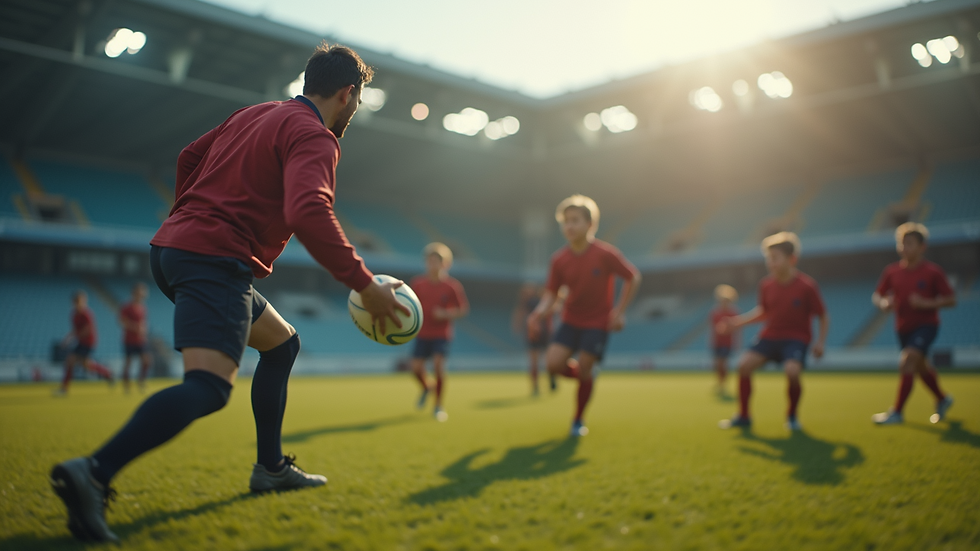Customized Rugby Training in Canada for School Players
- Dwayne Kemp
- Aug 7
- 4 min read
Rugby is more than just a sport; it is a way of life for many young athletes in Canada. As the popularity of rugby continues to grow, so does the need for tailored training programs that cater to the unique needs of school players. Customized rugby training can help young athletes develop their skills, improve their performance, and foster a love for the game. In this blog post, we will explore the benefits of personalized training, the key components of an effective program, and how to get started.
The Importance of Customized Training
Every player is different. Each athlete has unique strengths, weaknesses, and goals. Customized training allows coaches to focus on the individual needs of each player. This approach can lead to significant improvements in performance.
Benefits of Customized Training
Skill Development: Tailored training programs can help players develop specific skills, such as tackling, passing, and strategic thinking.
Injury Prevention: Personalized training can address individual physical limitations, reducing the risk of injury.
Increased Motivation: When players see progress in their skills, they are more likely to stay motivated and engaged.
Team Cohesion: Customized training can help players understand their roles within the team, fostering better teamwork.
Key Components of a Customized Rugby Training Program
Creating an effective training program requires careful planning. Here are some essential components to consider:
1. Assessment of Current Skills
Before starting any training program, it is crucial to assess the current skill level of each player. This can be done through:
Skill drills: Conduct drills that test passing, tackling, and running skills.
Fitness tests: Evaluate players' speed, strength, and endurance.
Game analysis: Review game footage to identify areas for improvement.
2. Setting Goals
Once players' skills have been assessed, it is time to set specific, measurable goals. Goals should be:
Realistic: Ensure that goals are achievable within a set timeframe.
Challenging: Players should feel motivated to push themselves.
Time-bound: Set deadlines for achieving each goal.
3. Developing a Training Plan
A well-structured training plan is essential for success. This plan should include:
Skill drills: Focus on specific skills that need improvement.
Fitness training: Incorporate strength and conditioning exercises.
Game strategy: Teach players about positioning, teamwork, and tactics.
4. Regular Feedback and Adjustments
Feedback is vital for growth. Coaches should provide regular feedback to players, highlighting areas of improvement and celebrating successes. Additionally, training plans should be adjusted based on players' progress.
Examples of Customized Training Drills
Here are some examples of drills that can be included in a customized training program:
1. Passing Drills
Partner Passing: Players pair up and practice passing the ball back and forth, focusing on accuracy and technique.
Circle Passing: Players form a circle and pass the ball around, increasing the speed and intensity as they improve.
2. Tackling Drills
Tackle Bags: Players practice tackling techniques using tackle bags to improve their form and confidence.
1-on-1 Tackling: Set up a drill where one player runs at another, who must successfully tackle them.
3. Fitness Drills
Sprints: Incorporate short sprints to improve speed and agility.
Circuit Training: Create a circuit that includes strength exercises, such as push-ups, squats, and lunges.
Finding the Right Coach
A qualified coach is essential for a successful customized training program. Here are some tips for finding the right coach:
1. Experience and Qualifications
Look for coaches with experience in rugby and relevant coaching certifications. A knowledgeable coach can provide valuable insights and guidance.
2. Communication Skills
A good coach should be able to communicate effectively with players. They should be able to explain drills clearly and provide constructive feedback.
3. Passion for the Game
Choose a coach who is passionate about rugby and dedicated to helping players improve. Their enthusiasm can inspire young athletes.
The Role of Parents in Customized Training
Parents play a crucial role in supporting their child's rugby journey. Here are some ways parents can help:
1. Encouragement
Encourage your child to set goals and work hard to achieve them. Celebrate their successes, no matter how small.
2. Transportation
Help with transportation to training sessions and games. Being present at practices can also show your support.
3. Communication with Coaches
Maintain open communication with coaches to stay informed about your child's progress and any areas that may need attention.
The Future of Rugby Training in Canada
As rugby continues to grow in popularity across Canada, the demand for customized training programs will only increase. Schools and clubs must adapt to meet the needs of young athletes. This includes investing in qualified coaches, developing tailored training programs, and fostering a supportive environment.
Embracing Technology
Technology can play a significant role in enhancing rugby training. Coaches can use video analysis to review players' performances and provide feedback. Additionally, fitness tracking apps can help players monitor their progress and set goals.
Building a Rugby Community
Creating a strong rugby community is essential for the growth of the sport. Schools, clubs, and organizations should work together to promote rugby and provide resources for players and coaches. This collaboration can lead to more opportunities for young athletes to develop their skills and passion for the game.
Final Thoughts
Customized rugby training is a game-changer for school players in Canada. By focusing on individual needs, young athletes can develop their skills, prevent injuries, and stay motivated. With the right training program, dedicated coaches, and supportive parents, the future of rugby in Canada looks bright.
As we continue to nurture the next generation of rugby players, let us remember the importance of fostering a love for the game. With the right support and resources, young athletes can achieve their goals and enjoy the journey along the way.



Comments